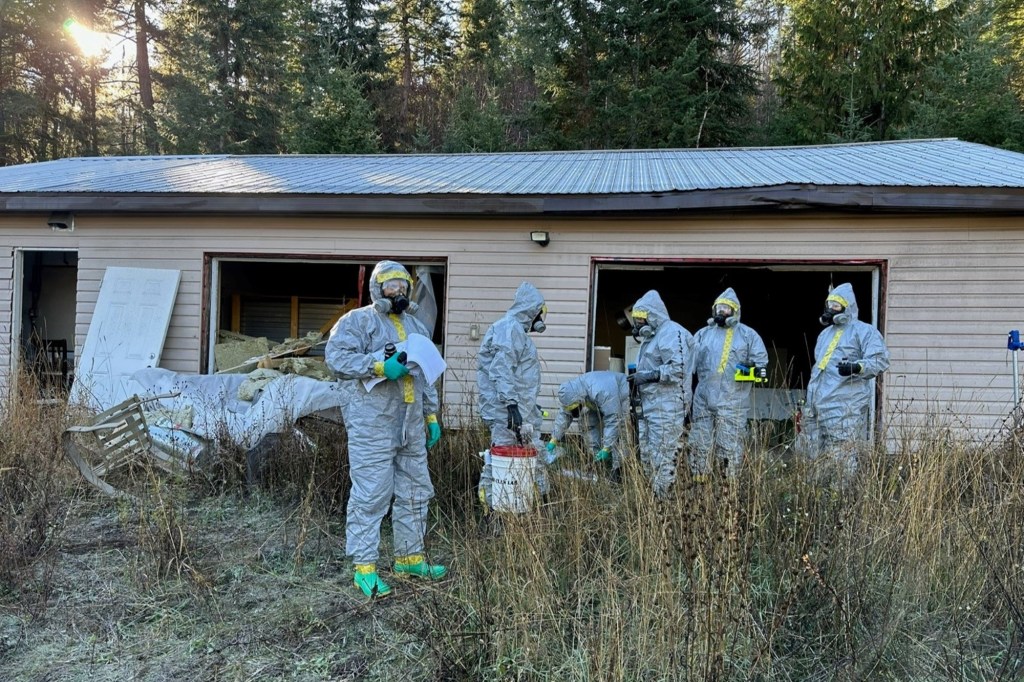In an affluent village just outside Manchester, an alleged drug-dealer had just had his hair cut. The man – let’s call him Clive – was barely two steps out of the barbers when he noticed six large figures striding purposefully towards him. They had earpieces in and were wearing utility vests, so he figured they were plain-clothed police officers – a suspicion that appeared to be confirmed when they grabbed and handcuffed him.
“You’re under arrest on suspicion of selling class A drugs,” they told him. Clive wasn’t surprised; a friend of his had recently been charged with a similar offence.
Videos by VICE
After driving him to a backstreet in a rundown area on the outskirts of the city, Clive’s captors told him there was no space left at the police station and let him out. It was at this point that the true reason for his abduction became clear: a masked gang member emerged from a van, wielding a replica firearm. A prison sentence would have been a desirable alternative to what lay in wait.
“We know who you are and what you do,” the masked man said. “Get us everything we want and everything will be alright.”
Clive was bundled into the van and driven to an industrial estate. There, a cement mixer was turned on to drown out his screams. He was burnt with a blowtorch and his testicles were tasered, before the gang phoned his brother-in-law, demanding cash. The burnings, electrocutions and beatings continued for the next 12 hours, until police finally stormed the building and set him free, which might well have saved his life.

This scenario may sound like a fictional scene from a Ray Winstone film, but it was just one of the many very real kidnappings to have taken place in Greater Manchester in recent years. The city has witnessed an increase of violence in this type of crime, with victims reportedly being waterboarded, blowtorched and scorched with hot irons in a bid to extract ransoms.
Gang-related-crime expert Professor John Pitts tells me that the escalation in violent kidnappings within the Mancunian underworld might be partly due to the impact coronavirus has had on drug supplies. He says this could have led to a situation in which dealers abduct others within the same profession and attempt to get them to hand over their stashes.
Robin* is a criminal from a town just outside Manchester, who has been involved in kidnappings involving torture. He said he believes that one of the reasons these violent crimes are on the rise could be because there are more potential targets for abductions, due to a greater number of people having become embroiled in the drug trade.
“No one’s going to kidnap a random person off the street,” Robin explained. “You don’t see someone kidnap a billionaire’s kid and try and get money like that. It’s not about that – it’s always other criminals that are kidnapped. The main motivation is always the same in any situation: money. Although, there can be other factors, like it could be a drug dealer taking over your turf, so you kidnap him and take his money and drugs, and let him know that if he comes round here again, it’s happening again, but this time he’s going to be dead.”
According to Robin, dealers are targeted because they typically have plenty of cash to pay the ransom, as well as associates who are more likely to pay up than the average person. Importantly – or so goes the thinking of the perpetrators – they’re also unlikely to seek help from the authorities.
“I know people who have been seriously hurt,” said Robin, “but when the police have gone to the hospital thinking they can talk to them and whatnot, they still wouldn’t give a statement.”
This is likely as much down to a fear of repercussions as it is to the code of silence associated with the drug world. According to Detective Sergeant Julie Connor of the Greater Manchester Police, the kidnappers involved in these abductions have often done their homework and know their victims’ home addresses, meaning that going to the police could have dire consequences for them and their loved ones.
Many victims would also rather forget about their ordeals and never have them brought up again, but are unable to do so because of the mental and physical trauma they endured. This is the case for Clint*, a drug dealer who was snatched off the street by rival dealers, taken to a garage and beaten with a hammer, before eventually being set free.
“I’ve got things wrong with my legs and shoulders for life,” he said. “There’s no recovery when you get whacked with a hammer; it changes your life.”
Despite this horrifying experience, Clint accepts being kidnapped and beaten as an occupational hazard. “It’s part of the risk,” he explained. “There’s a lot of money knocking about – huge amounts. That’s why it’s worth some guy who drives a bus clubbing together with his mates and investing in a kilo. But there’s people who are waiting. That’s their job – taking [things] off dealers.”
*Names have been changed.
More
From VICE
-

Ashley Rowland/Moore Police Department -

(Photo by Jens Büttner/picture alliance via Getty Images) -

(Photo by Mike Marsland/WireImage) -

(Photo via Royal Canadian Mounted Police)


